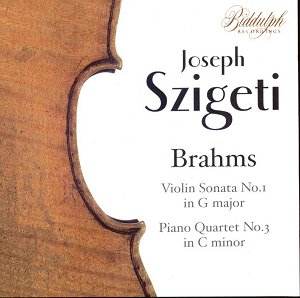Szigeti made some of the greatest recordings
of the Brahms Concerto and the Op.108 Sonata ever committed
to disc. The first was with the Hallé and Hamilton Harty and
the second with Egon Petri. It’s perhaps less well known that
post-War he recorded a cycle of the sonatas with Mieczyslaw
Horszowski that spanned the 1950s, starting in early LP mono
and ending in stereo. Biddulph have here given us the First,
taped in 1951, and maybe the rest of the cycle will emerge in
due course. These come from a period that is, with good reason,
the least well documented of Szigeti’s legacy. The problems
that increasingly (if inconsistently) attended to his playing
are well known to his admirers and cannot be gainsaid. So those
who are familiar with Szigeti from roughly 1927-38 should not
expect to find this noble musician untarnished and the list
of deficiencies that one must inevitably note should be seen
in the context of his waning control and illness.
The
First Sonata is a noble carapace of a reading illuminated especially
by Horszowski’s ever-sensitive pianism. They recorded together
frequently and his supportive sensitivity offers a tissue of
coherence and imagination. So, it’s true, does Szigeti but his
playing is but a ghost of his prime. There are frequent intonational
slippages, the vibrato is now woefully slow (and thus incapable
of rapid inflection) and the tone is terribly thin and starved.
Columbia also had the bad idea to record
him up close – maybe as a result of an endemic lack of projection
– so these faults are magnified. Szigeti suffered from diabetes
and I believe, later on, Parkinson’s Disease – and there are
signs here of that dreaded enemy, bow shake (not to labour the
point but try 6.50 in the first movement; it’s generally on
sustained notes, exacerbated by the low Hubay bowing arm.) The
legato of the slow movement is compromised by all these frailties.
The phrasing itself in other circumstances would be luminous
but the melancholic direction is not sustained by technical
competence and there’s no allure or vibrance to Szigeti’s tone.
The measured finale comes off best – though he’s not able to
“lift” the rhetoric with any athleticism and the roughness of
the playing becomes wearying.
Though
the Piano Quartet was recorded the following year he had some
stellar support and the advantage of being tonally submerged
– also, it’s true, of the famous Prades acoustic, which always
tended to be rather distant and none too clear. This is a serious
but songful reading in which his colleague Myra Hess, whom he’d
known by then for over forty years when they’d performed together
in turn-of-the-century London, is commanding and powerful. Katims
and Tortelier shepherd Szigeti with considerable delicacy; their
playing may be ultimately tonally incongruous but one doesn’t
notice too often. Hess leads in the Scherzo, whilst Tortelier
proves nobly aloof in the slow movement, warmly expressive enough
to cover the thinness in his violin partner’s playing. Measured
but involved the string players’ intonation does waver now and
then in the finale but the gains are ones of commitment and
drama.
The
transfers have presumably used (Biddulph doesn’t say or give
source material) the original LP pressings. These sound well
enough though iniquities of balance in the Sonata and distance
in the Quartet are inherent. This is very much for Szigeti completists
– I’m not aware of any previous reappearances of this Op.78
Sonata; to those for whom the ubiquity of those fabled older
recordings might encourage a purchase I would just urge respectful,
understanding caution.
Jonathan
Woolf


